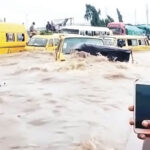By the time he died on 18th December last year, Usman Faruk was the last of the first generation of military governors of the then newly-created six northern states to depart to the hereafter. When they were appointed in May 1967, the six governors were all very young. Two of them were just in their twenties, Musa Usman of North-East and David Bamigboye of Kwara, while three were in their thirties, Joseph Gomwalk of Benue-Plateau, Abba Kyari of North-Central and Usman Faruk. Only Audu Bako of Kano State was in his early forties. But then you also have to put the era in its context: The Head of State, Yakubu Gowon was also in his early thirties.
Usman Faruk was posted to take charge of the North-Western State (NWS). He had just been promoted to the post of Superintendent of Police two days earlier and was in charge of Kaduna Capital Territory as Principal Police Officer (PPO). A superintendent was a high rank then in the Nigerian Police of the1960s that was in the process of being rapidly indigenised. The North-Western State that Usman Faruk was heading to, now comprises Sokoto, Niger, Kebbi and Zamfara States. The state had the second-largest land area in the country and was one of the most populous. It was the hub of the caliphate and had more high ranking emirs and chiefs than probably any other state.
- I fight so no girl experiences what I went through — African of the Year
- APC sweeps all chairmanship, councillorship seats in Kano
It was a great challenge for the young governor but he was fortunate to have as a support base of much older and more experienced civil servants that were deployed to the NWS and other new states, from the pool of civil servants of the defunct Northern Nigerian Government. He also had a large number of politicians from the old civilian regime, such as former ministers Shehu Shagari, Ibrahim Tanko Galadiman Bida, Ibrahim Gusau and Umaru Audi Wazirin Minna to help him as commissioners. Sultan Abubakar Siddique III even allowed his son Muhammadu Maccido, a future Sultan himself to serve as commissioner. It was an extraordinary time with the spectre of the Nigerian federation falling apart and a looming civil war ahead.
Usman Faruk governed the NWS for more than eight years till 1975 when the Gowon regime was overthrown in a palace coup orchestrated by fellow military officers. It was a regime change many had foreseen. The regime had remained for too long after successfully executing the civil war and Yakubu Gowon himself had reneged on a promised handover date of 1976 to a civilian administration. That and other ill-feelings within the military establishment fuelled the inevitability of the coup. Usman Faruk was caught smack in the whirlwind of the coup as he was in Uganda with General Gowon attending an OAU event when the coup unfolded.
Being a player in a regime that was overthrown had a number of consequences and Usman Faruk suffered the worst of them. He along with the majority of his colleague governors were vilified, accused of wanton corruption and were tried by military tribunals, which found them guilty and consequently suffered not only loss of office but had most of their properties seized. They suffered the loss of dignity, public opprobrium and were hounded by the government of the day, from one end to the other.
Usman Faruk was adamant that he did no wrong and was unrelenting in professing his innocence through a series of petitions over a number of years. Finally, on the basis of Usman Faruk’s persistent petitions, President Ibrahim Babangida set up a committee that carefully investigated the whole saga. They found out that the tribunal did not even give Usman Faruk the opportunity to defend himself. The President then upturned the judgement of the military tribunals and cleared Usman Faruk of the alleged wrongdoings. That set the stage for him to recover his rank within the Police Force, his pensions and gratuities, his properties and above all his dignity and place in history. The beauty of his struggle was that the gesture was extended to all those who were wronged by the military tribunals.
As a top-class detective educated in some of the best police colleges in the world, Usman Faruk kept many vital historical documents, which he freely allowed access to researchers. He also chronicled his life struggle in the epic memoir he wrote that was released in 2006: From Farm House to Government House. I came to be closely associated with him during the preparations to launch the book. During that period, I was a desk officer in the State House in a department that lent a helping hand to retired public officers writing their biographies and memoirs. Throughout my association with him, he was the epitome of humility and was always ready to air his perspectives on events. I can say I got more clarity on events of the 1960s and 70s from him than I got from anywhere else.
One attribute of Usman Faruk was that he also never shied away from controversial issues. He was a man of strongly held views. This much is evident from his memoir and the subsequent book he released in 2011: The Victors and the Vanquished of the Nigerian Civil War, 1967-70.



